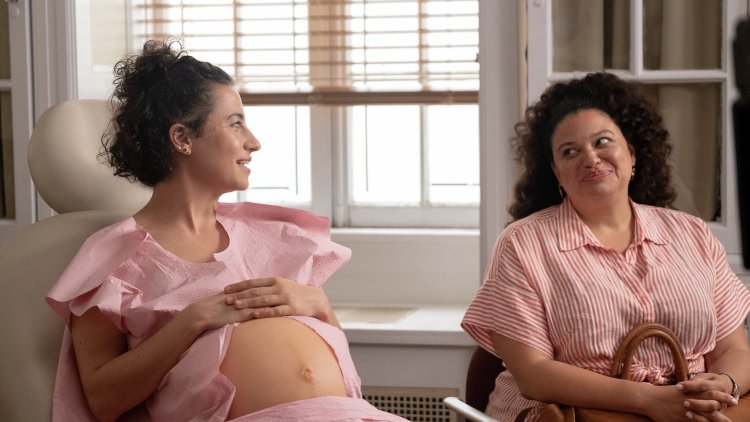A Raunchy Comedy About … Pregnancy?
Babes isn’t perfect, but its refreshing candor still feels like an R-rated public service.

Preparing a birth plan requires considering the many things that could go wrong during childbirth—or, in the best-case scenario of everything proceeding as normal, how you might attempt to mitigate earth-shattering pain. In Babes, a new comedy about two best friends navigating pregnancy and the delirium of postpartum life, one woman is determined to approach her birth plan differently. Early in her pregnancy, Eden (played by Ilana Glazer) announces that she’d like to bring a little joy into a process that’s otherwise unsettling and clinical. Wanting the day of delivery to feel more like a costume party, she decides to call it “Eden’s Prom Birth Extravaganza.”
This scene, one of many that take place in her obstetrician’s office, captures the most compelling part of Babes: its attention to, and irreverence toward, the unglamorous specifics of pregnancy. The film throws the horrors, confusion, and wonders of pregnancy into a raunchy comedy that revels in gross-out bodily humor. There are no graphic Dead Ringers–like visuals, but discussions leave little to the imagination: At the start of the film, Eden’s best friend, Dawn (Michelle Buteau), is close to the end of her second pregnancy. Dawn asks Eden to check if she’s started dilating. Crouching to take a look under her friend’s dress, a wide-eyed Eden informs her, “Your vagina looks like it’s yawning.”
Babes, which was directed by Pamela Adlon, is the product of an all-star team: Adlon co-created and starred in Better Things, a remarkable, offbeat FX series about a single mother trying to make it in Hollywood. The film’s screenplay comes from television heavyweights too—it was co-written by Glazer, who co-created Broad City, and Josh Rabinowitz, a consulting producer on that series who also worked on The Carmichael Show and Ramy. And Buteau, a comedian, recently starred in Survival of the Thickest, an endearing coming-of-age series she co-created. In theory, a pregnancy raunch-com coming from this crew should’ve been a riotous but poignant romp. Babes doesn’t quite get there. The film tries to balance its lighter fare with weightier themes—aging out of friendships once children come into play, the guilt that can accompany postpartum depression, the insularity of the nuclear family. That’s a tall order, and Babes never really reconciles the gravity of Dawn and Eden’s growing distance from each other with the comedic territory where its two stars are clearly more comfortable.
The film’s surplus of toilet humor is admittedly not for me. (Neither was the much-discussed food-poisoning debacle in Bridesmaids.) Still, there’s something charming about how Babes exaggerates the indignity of losing control over one’s body: When Dawn is upset about being unable to produce milk after her daughter is born, she calls in a lactation consultant who ends up hawking “Her Majesty,” a terrifying contraption that looks disturbingly similar to an HVAC machine. There are mushroom trips, a gag involving Eden trying out multiple pregnancy tests, and a dreamlike sequence featuring projectile breast milk—and in these wacky scenes, Glazer and Buteau are a truly dynamic duo, leaning into the film’s over-the-top physical comedy without hesitation.
Where Babes falters is the comedown. Eden’s pregnancy is the result of a one-night stand, and the father, for reasons I won’t spoil, isn’t in the picture. Faced with the prospect of raising a child alone in her fourth-floor walk-up, Eden chooses to go through with her pregnancy. This is a screwball comedy set in a version of New York City where she can afford a massive, light-filled apartment without family support, so maybe not everything needs to make sense. But Eden is notably flighty, and visibly horrified by the messiness of Dawn’s childbirth; still, she pitches headfirst into having a child without much thought. The unexplained decision ends up somehow feeling even less earned than the unplanned pregnancies of the Judd Apatow cinematic universe.
Dawn, for her part, seems baffled by—and later resentful of—Eden’s decision, an early indication that the pregnancy will challenge the women’s already-changing relationship. Sustaining close friendships in adulthood, especially as a parent, can be incredibly challenging—and because the strain of motherhood doesn’t end with labor, Babes brings the reality of raising children in the United States into sharp focus. Through a series of calamitous events that unfold in Dawn’s household, the film portrays the effects of policy decisions that have made the U.S. a needlessly difficult place to have kids. Child-care woes keep Dawn away from work, and from the doctor’s appointments where Eden desperately wants her support. Nothing she does—for herself or for her family—ever feels like enough. “Exhausted actually doesn’t even cover it,” Dawn says in a fight with Eden, before comparing raising two youg children to “an endless loop of other people’s needs.”
Through these bittersweet observations, Glazer and Buteau still bring plenty of charm. The actors are a playful pairing, building on each other’s comedic inclinations in a way that sometimes makes Babes feel like a more grown-up Broad City. Watching the moment when Dawn seems perplexed by Eden’s decision to go through with the pregnancy, I was immediately reminded of the classic Broad City scene in which Glazer’s 27-year-old character reacts to the idea of getting married by saying, “What am I, a child bride?” Dawn isn’t there to witness some of the shocking things that Eden later learns about pregnancy—like the size of the needle used in an amniocentesis, or the fact that some pregnancies stretch past the 40-week mark. But when the time finally comes for Eden’s Prom Birth Extravaganza, it’s Dawn who commiserates with her about the injustice of having to push her placenta out too: “They don’t tell you about this part.” It’s true—that detail tends to get left out of the storybook ending in which no one needs stitches. Babes isn’t perfect, but its refreshing candor still feels like an R-rated public service.
What's Your Reaction?




















